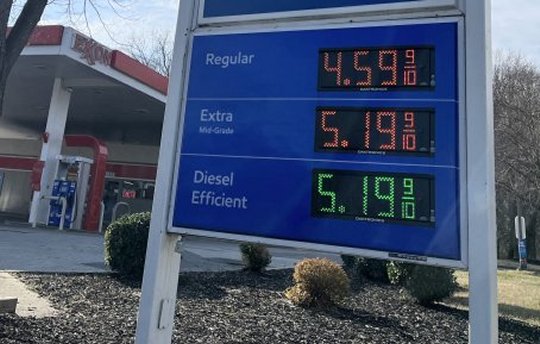 Gas prices in Maryland have surged over 83 cents in the past month, as consumers all over the country feel the price of everything from inflation to the Russian invasion of Ukraine at the pump. (Photo: Kaitlyn Levinson)
Gas prices in Maryland have surged over 83 cents in the past month, as consumers all over the country feel the price of everything from inflation to the Russian invasion of Ukraine at the pump. (Photo: Kaitlyn Levinson)ANNAPOLIS (March 10, 2022)—Maryland's budget surplus grew to $7.5 billion, as the board charged with projecting state revenues revised its forecasts Thursday to add $1.6 billion to the state's coffers.
Comptroller Peter Franchot, a board member and Democratic candidate for governor, called on state legislators to use a portion of the surplus to lower gas prices by suspending the state's 37-cent gas tax for three months.
Fuel prices in the U.S. have swelled in the wake of inflation and the Russian invasion of Ukraine, with President Joe Biden announcing earlier this week a ban on imports of Russian oil. Marylanders are paying an average of $4.30 at the pump, an increase of over 83 cents from a month ago and a 55-cent bump from just last week, according to AAA gas price trackers.
"Our residents shouldn't shoulder the brunt of Putin's criminal action and the efforts of the free world to stop the bloodshed and destruction that Putin is causing in Ukraine," Franchot said at the meeting.
Gov. Larry Hogan, R, announced in a statement after the board meeting he was working with legislators to put together an emergency package that would suspend the gas tax.
Other states are considering similar actions.
The report came from the Maryland Board of Revenue Estimates, consisting of Franchot, Budget and Management Secretary David R. Brinkley and state Treasurer Dereck E. Davis, that forecasts the state's revenues by reviewing income from individual and corporate taxes and other state income.
The revised forecast's increased revenue projections for 2022 and 2023 sets up a renewed battle over how to spend the state's unprecedented surplus.
Franchot said he wants the state to use the extra cash to alleviate the financial impact of the coronavirus pandemic and crisis in Ukraine. A three-month gas tax holiday, allowing gas stations to drop prices by around 36 cents, would cost the state around $250 million, Franchot said.
"We're at war with Putin," Franchot said in an interview with Capital News Service after the meeting. "Stand with us, don't stand with Putin and pretend we shouldn't be heavily involved in Ukraine because it means our gas prices go up. We can help with this gas tax holiday."
The gas-tax debate is being held all over the country. Some states, like Florida, have decided to drop their gas tax for short periods of time. Governors in other states, like Wisconsin and Michigan, are urging the federal government to suspend the federal gas tax.
Massachusetts lawmakers defeated a push Wednesday to suspend the state tax, saying the effort was irresponsible.
Some Democratic senators in Washington are pushing for the federal government to suspend the tax, but President Joe Biden has maintained the government "can't do much right now," blaming Russia for the surging prices.
At the meeting, Franchot also said the state should use the money to send out checks of up to $2,000 to low to moderate-income workers, which, he said, would cost the state nearly $1 billion.
Maryland sent checks of up to $500 to low to moderate-income workers and families in 2021.
Franchot said the legislature could pass the checks quickly and the state could distribute the checks "within 24 hours."
"It is essential that we do the right thing and get the money to them immediately," Franchot said in an interview. "I am not talking weeks from now. I am talking days, or even 24 to 48 hours, if the political will was there."
Franchot said he was hearing "good things" from legislators about the proposal.
Hogan has made clear his priorities in spending the state's surplus, proposing tax breaks for retirees, funding for large construction projects and investing $500 million in law enforcement over the next three years.
State Budget Secretary Brinkley cautioned legislators to avoid passing expensive legislation, and urged them to set aside a significant portion of the surplus for the state's rainy day fund.
Even though jobs remained about 100,000 less than pre-pandemic levels, officials said at the meeting, the state saw an increase in revenue due to increases in individual wages.


